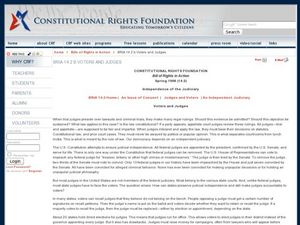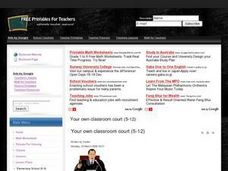Curated OER
Senate Judiciary Committee Confirmation Simulation
Students research the Supreme Court judicial selection process while role playing. They examine the political nature of the process and discuss merits of Supreme Court nominees.
Curated OER
Choosing the Lincoln Statue
Fourth graders research photographs or artwork depicting Abraham Lincoln during the time when he was traveling the 8th Judicial Circuit and practicing law in Champaign County. They develop a Powerpoint presentation of the results of the...
Curated OER
The Powers of Mom: Understanding the Legislative, Executive and Judicial Power
Tenth graders examine the powers of each branch of the government. They analyze the causes and effects of relationships within the government. They participate in activities to help them comprehend the material.
Curated OER
Justice Is Blind, Colorblind That Is
It's so interesting to see kids respond to articles about education. To start the day, prompt learners to discuss the words colorblindness and diversity. Then, split your class in two and have one side read an article from 2007 and the...
Curated OER
Voters and Judges
Students analyze the work on independent judiciaries. In this federal courts lesson, students listen to their instructor lecture on details of federal cases. Students respond to discussion questions and participate in an activity...
Curated OER
Laws...Who Needs Them?
Who needs laws? Junior high schoolers sure do! Provide your 7th-9th graders with an understandng about why laws are important and how they are used to create a functioning society. Learners use a series of handouts and readings to build...
Foreign Policy Research Institute
Understanding China: The Prospects for Democracy in China
This document provides useful information for a unit on democracy in China. While it does not include detailed activities, it does have a list of democratic principles, and important facts about China that facilitate understanding of its...
Curated OER
The Judiciary in American History
Learners investigate the influence of political and societal forces on judicial decisions. Among the topics they examine are the selection of judges and the cause and effect relationship between politics, society, and the law. to...
Judicial Learning Center
Why Study Landmark Cases?
Why study landmark Supreme court cases? A helpful lesson offers a brief but valuable argument for the importance of these cases in the field of criminology. It introduces scholars to some key terms necessary for studying court cases and...
State Bar of Texas
Dred Scott v. Sandford
Who decides someone is not a real person? Scholars investigate the Dred Scott v. Sandford court case which deals directly with slavery and citizenship. After viewing a short video clip, classmates work in pairs to assess and discuss the...
Judicial Learning Center
The Judge and the Jury
Unless you are a lawyer, you might not understand just how unrealistic Law and Order and other legal dramas actually are. Here's a great resource to help scholars of criminology gain a more realistic perspective. The lesson outlines the...
C-SPAN
Middle School Checks and Balances
Seven video clips reveal how the checks and balances built into the constitutional framework of the United states' government are designed to keep any one branch from becoming too powerful. After watching each clip, groups identify the...
Curated OER
American History Through the Len of the Supreme Court Decisions
Students examine the historical background of Supreme Court decisions and the basic principles behind legislation. As part of the lesson, students discover legal concepts and terms and write sentences using the vocabulary they have...
C-SPAN
Presidential Veto and Congressional Override
One of the key powers of the executive branch is the president's ability to pass or veto legislation proposed by Congress. Congress, the legislative branch, on the other hand, can override a president's veto. Five film clips show how the...
Judicial Branch of California
Separate But Equal - Is It Black or White?
The story of Ruby Bridges and the case of Brown vs. The Board of Education are fantastic tools for discussing the concept of separate but equal. Kids tackle some big questions about what is fair, what is civil, and what rights or laws...
Curated OER
The Nuclear Option
Students explore the history behind judicial nominations as well as the filibuster process. They discuss and debate filibuster merits and detractions, its use and alleged misuse, and what some Congressional leaders are currently doing...
Curated OER
Trials and Tribulations
Students explore their beliefs about objectivity and the United States justice system. They examine the facets of a criminal case by researching various aspects of the judicial system and apply what they have learned to the Michael...
Curated OER
Checks and Balances in Supreme Court Nominations
Learners discover the system of Checks and Balances related to recent events prompting action by one or more of the three branches of government. They study the process for selecting and confirming a Supreme Court justice. They examine...
Curated OER
All Talk, No Action
Students act as senators to negotiate a compromise on judicial filibusters. For homework, they write letters to their senators analyzing the filibuster debate and making recommendations for the future.
Curated OER
Building the Foundation
Students understand the purpose of the judicial branch of government. In this judiciary lesson, students participate in exercises to understand how the court system works. Students complete activity sheets to develop understanding of...
Curated OER
Your Own Classroom Court
Students role play a court with lawyers, a judge, jury, and more. In this classroom court lesson plan, students review rules of the law in the judicial system.
Curated OER
Marriage Equality: Different Strategies for Attaining Equal Rights
Students examine gays rights issues in the United States. In this gay marriage lesson, students investigate how people have made their cases before the executive, legislative, and judicial branches of government to secure their civil...
Curated OER
The "Big Four" of the Michigan Supreme Court
Learners identify the justices on the Michigan Supreme Court known as the "Big Four". They relate to them by researching their lives. They participate in an activity in which they practice their investigation and presentation skills.

























